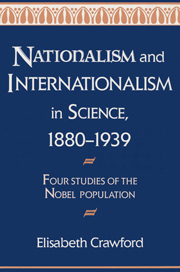Book contents
- Frontmatter
- Contents
- List of tables and figures
- Acknowledgment
- Introduction
- PART I CONCEPTUAL AND HISTORIOGRAPHICAL ISSUES
- PART II CRITICAL AND EMPIRICAL STUDIES
- 3 Internationalism in science as a casualty of World War I
- 4 Center-periphery relations in science: the case of Central Europe
- 5 National purpose and international symbols: the Kaiser-Wilhelm Society and the Nobel institution
- 6 Nobel laureates as an elite in American science
- Bibliographical essay
- Index
5 - National purpose and international symbols: the Kaiser-Wilhelm Society and the Nobel institution
Published online by Cambridge University Press: 06 November 2009
- Frontmatter
- Contents
- List of tables and figures
- Acknowledgment
- Introduction
- PART I CONCEPTUAL AND HISTORIOGRAPHICAL ISSUES
- PART II CRITICAL AND EMPIRICAL STUDIES
- 3 Internationalism in science as a casualty of World War I
- 4 Center-periphery relations in science: the case of Central Europe
- 5 National purpose and international symbols: the Kaiser-Wilhelm Society and the Nobel institution
- 6 Nobel laureates as an elite in American science
- Bibliographical essay
- Index
Summary
The Kaiser-Wilhelm Society for the Advancement of Science (known as KWG, which in German stands for Kaiser-Wilhelm-Gesellschaft zur Forderung der Wissenschaften) and the Nobel institution had in common the goal of promoting elite science. To accomplish this purpose each had, a few years after its establishment, about the same income and capital including buildings. That what each bought with these monies was altogether dissimilar was a consequence of the very different purposes of the two institutions. For this reason, their interactions, which concerned important aspects of the workings of both, are particularly instructive.
The purpose of the KWG, founded in 1911, was first and foremost to tap private money by recruiting paying members and other donors to the society and only secondarily to use government assistance to build, equip, and operate independent research institutes in different branches of science. These were the Kaiser Wilhelm Institutes (KWIs). It was a national purpose in that the stated rationale for the enterprise was that the productivity of professors (the main research force in Germany) had been curtailed by their obligation to teach an ever-growing number of students, who, to make matters worse, made important demands on equipment and assistants. It is not the purpose here to determine how well these claims fit the facts.
- Type
- Chapter
- Information
- Nationalism and Internationalism in Science, 1880–1939Four Studies of the Nobel Population, pp. 106 - 124Publisher: Cambridge University PressPrint publication year: 1992

